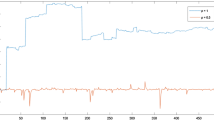Abstract
The usual estimator for the expectation of a function under the innovation distribution of a nonlinear autoregressive model is the empirical estimator based on estimated innovations. It can be improved by exploiting that the innovation distribution has mean zero. We show that the resulting estimator is efficient if the innovations are estimated with an efficient estimator for the autoregression parameter. Efficiency of this estimator is necessary except when the expectation of the function can be estimated adaptively. Analogous results hold for heteroscedastic models.
Similar content being viewed by others
References
Bickel, P. J., Klaassen, C. A. J., Ritov, Y. and Wellner, J. A. (1998). Efficient and Adaptive Estimation for Semiparametric Models, Springer, New York.
Boldin, M. V. (1982). Estimation of the distribution of noise in an autoregression scheme, Theory Probab. Appl., 27, 866–871.
Drost, F. C., Klaassen, C. A. J. and Werker, B. J. M. (1997). Adaptive estimation in time-series models, Ann. Statist., 25, 786–817.
Ghoudi, K. and Rémillard, B. (1998). Empirical processes based on pseudo-observations, Asymptotic Methods in Probability and Statistics (ed. B. Szyszkowicz), 171–197, North-Holland, Amsterdam.
Hájek, J. (1970). A characterization of limiting distributions of regular estimates, Z. Wahrsch. Verw. Gebiete, 14, 323–330.
Ibragimov, I. A. and Has'minskii, R. Z. (1981). Statistical Estimation. Asymptotic Theory, Appl. Math., 16, Springer, New York.
Jeganathan, P. (1995). Some aspects of asymptotic theory with applications to time series models, Econometric Theory, 11, 818–887.
Klaassen, C. A. J. and Putter, H. (1999). Efficient estimation of Banach parameters in semiparametric models. Tech. Report, Department of Mathematics, University of Amsterdam.
Koul, H. L. (1992). Weighted Empiricals and Linear Models, IMS Lecture Notes-Monograph Series, Vol. 21, Institute of Mathematical Statistics, Hayward, California.
Koul, H. L. (1996). Asymptotics of some estimators and sequential residual empiricals in nonlinear time series, Ann. Statist, 24, 380–404.
Koul, H. L. and Levental, S. (1989). Weak convergence of the residual empirical process in explosive autoregression, Ann. Statist., 17, 1784–1794.
Koul, H. L. and Schick, A. (1997). Efficient estimation in nonlinear autoregressive time series models, Bernoulli, 3, 247–277.
Kreiss, J.-P. (1987a). On adaptive estimation in stationary ARMA processes, Ann. Statist., 15, 112–133.
Kreiss, J.-P. (1987b). On adaptive estimation in autoregressive models when there are nuisance functions, Statist. Decisions, 5, 59–76.
Levit, B. Y. (1975). Conditional estimation of linear functionals, Problems Inform. Transmission, 11, 39–54.
Schick, A. and Susarla, V. (1990). An infinite dimensional convolution theorem with applications to random censoring and missing data models, J. Statist. Plann. Inference, 24, 13–23.
Wefelmeyer, W. (1994). An efficient estimator for the expectation of a bounded function under the residual distribution of an autoregressive process, Ann. Inst. Statist. Math., 46, 309–315.
Author information
Authors and Affiliations
About this article
Cite this article
Schick, A., Wefelmeyer, W. Estimating the Innovation Distribution in Nonlinear Autoregressive Models. Annals of the Institute of Statistical Mathematics 54, 245–260 (2002). https://doi.org/10.1023/A:1022413700321
Issue Date:
DOI: https://doi.org/10.1023/A:1022413700321



